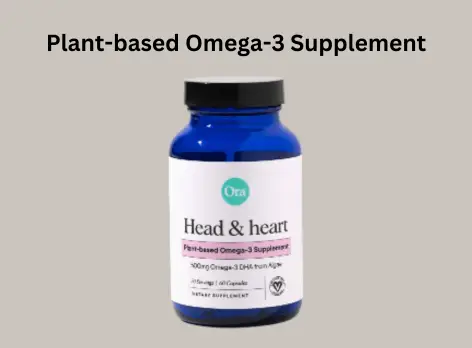Table of Contents
ToggleIntroduction
Are you to enhance your overall well-being the natural way Plant based omega-3 acids might just be the answer to your quest for a healthier lifestyle. this blog post will delve deep into the plant based omega-3s, exploring benefits, food sources, and how they can impact your health. Let’s get started on your journey to a healthier you!
Understanding Omega-3 Fatty Acids: Nature's Gift to Health
To maintain optimal health, Omega-3 fatty acids are essential nutrients. These fatty acids are polyunsaturated fats that serve as building blocks for cell membranes while also supporting heart and brain health. While omega-3s are commonly found in fatty fish like salmon, mackerel, and sardines, plant-based sources provide a viable alternative for individuals following a vegetarian or vegan diet.
- Unlock vibrant health with our Plant-based Omega-3 Supplement.
- Support your brain, heart, and eyes naturally.
- Enjoy 5x more bioavailability compared to standard fish oil.
- Experience optimal nutrient absorption for holistic well-being.
- Elevate your wellness journey with every dose.
Types of Omega-3 Fatty Acids
Omega-3 fatty acids are categorized into three primary forms:
- ALA (Alpha-Linolenic Acid): Flaxseeds, chia seeds, walnuts, and hemp seeds are all plant-based sources where it can be found.
- EPA (Eicosapentaenoic Acid): Predominantly sourced from marine algae and plays a crucial role in reducing inflammation.
- DHA (Docosahexaenoic Acid): Also obtained from algae and vital for brain function and development.
Benefits of Plant-Based Omega-3 Fatty Acids

Incorporating plant based omega-3 fatty acids into your diet can offer a wide array of health benefits. Let’s explore some of the key advantages of including these essential nutrients in your daily meals:
1. Heart Health
Omega-3 fatty acids have been associated with a reduced risk of heart disease by lowering triglyceride levels, decreasing blood pressure, and mitigating inflammation. ALA, in particular, has shown promising results in supporting cardiovascular health.
2. Brain Function
DHA, a crucial component of omega-3 fatty acids, is integral to optimal brain function and cognitive development. Including plant-based sources of DHA in your diet can support memory, focus, and overall cognitive performance.
3. Joint Health
Omega-3 fatty acids possess anti-inflammatory properties that can alleviate joint pain and stiffness in conditions such as arthritis. Adding plant-based sources rich in ALA to your meals may help reduce inflammation and enhance joint mobility.
4. Mood Regulation
Research suggests that omega-3 fatty acids play a role in regulating mood and may aid in managing conditions like depression and anxiety. Including plant-based omega-3s in your diet could potentially contribute to overall emotional well-being.
5. Skin and Hair Health
The anti-inflammatory properties of omega-3 fatty acids can benefit your skin by reducing inflammation, promoting hydration, and protecting against sun damage. These nutrients also play a role in maintaining healthy hair, making it strong and shiny.
Plant-Based Sources of Omega-3 Fatty Acids

Now that we’ve explored the benefits of plant-based omega-3 fatty acids, let’s take a closer look at some of the top sources that can help you meet your daily requirements:
1. Flaxseeds
Flaxseeds are rich in ALA and can easily be incorporated into your diet by sprinkling them over yogurt, oatmeal, or salads. Additionally, they provide a substantial amount of fiber and essential vitamins and minerals.
2. Chia Seeds
Chia seeds are another excellent source of ALA, fiber, and protein. These versatile seeds can be used in smoothies, puddings, or baked goods to boost your omega-3 intake effortlessly.
3. Walnuts
Walnuts are not only delicious but also packed with ALA, antioxidants, and healthy fats. Snack on a handful of walnuts or add them to your salads or oatmeal for a nutrient-rich treat.
4. Hemp Seeds
Hemp seeds are a complete protein source that contains a balanced ratio of omega-3 and omega-6 fatty acids. Sprinkle hemp seeds on your soups, yogurt, or cereal for an added nutritional punch.
Incorporating Plant-Based Omega-3s in Your Diet

If you’re looking to enhance your omega-3 intake through plant-based sources, here are some practical tips to help you get started:
1. Include Flaxseed Oil in Your Dressings
Flaxseed oil can be added to salads or used in homemade salad dressings to enhance the flavor and omega-3 fatty acids.
2. Make Chia Seed Pudding
Whip up a delicious chia seed pudding by combining chia seeds with your favorite plant-based milk and sweetener. Let it sit overnight in the refrigerator for a satisfying and nutritious snack.
3. Snack on Walnuts
Keep a stash of walnuts handy for a quick and convenient snack that provides a dose of omega-3 fatty acids along with fiber and antioxidants.
4. Blend Hemp Seeds into Smoothies
Enhance the nutritional profile of your morning smoothie by blending hemp seeds with fruits, leafy greens, and plant-based protein for a well-rounded meal.
Conclusion: Embrace the Power of Plant-Based Omega-3s
In conclusion, plant-based omega-3 fatty acids offer a natural and wholesome way to boost your health and well-being. By incorporating sources such as flaxseeds, chia seeds, walnuts, and hemp seeds into your diet, you can reap the numerous benefits these essential nutrients provide. Whether you’re looking to support heart health, enhance brain function, improve joint mobility, regulate mood, or promote skin and hair health, plant-based omega-3s have got you covered.
So, why not take a step towards a healthier you by embracing the power of plant-based omega-3s? Start small by making simple dietary swaps and gradually increase your intake of these beneficial fatty acids. Your body will thank you for it, and you’ll be well on your way to a vibrant and thriving lifestyle fueled by the natural goodness of omega-3s from plants. Here’s to your health and vitality!


